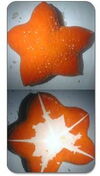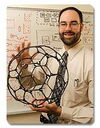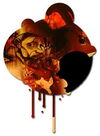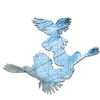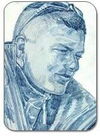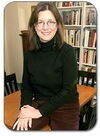2005-04-01
- Geology graduate student Chris Mah's discovery of a new species of starfish reads like an old-fashioned detective story.The mystery began eight years ago off the coast of Palau in the 400-feet depths of the central Pacific, a place only "dive nuts" equipped with mixed gas re-breathing units dare to tread. It was in this murky realm, where, according to...
- 2005-04-01 - The rich variety of English language expression goes well beyond the British or American versions. A group of University of Illinois graduate students set out this year to explore the diverse ethnic ways of speaking English, and how the language can overcome barriers set up by native and non-native speakers to truly emerge as a worldwide lingua franca.Twice monthly, the group gathers to share...
- 2005-04-01 - The orange (and blue) that appeared to be everywhere during basketball season only seem as if they have been Illinois' colors forever. During the University's first quarter-century, a loyal Illini may have donned gold and black or green and white.Patrick Hayes, a development officer in LAS who once worked for the UI Alumni Association, discovered this little-known nugget of trivia in 1983, in...
- 2005-04-01 - Spend an hour with the first five students designated as Civic Leadership Fellows at Illinois and any fears about the future-who's taking us into it and how-are doused. For example, Kasey Umland, a graduate student from Monee, Illinois, wants to have a hand in restructuring the International Monetary Fund and the World Bank as a first step toward improving economic development around the world...
- 2005-04-01 - They're just the stuff to wire tomorrow's molecule-sized computer chips, make fibers tougher than Kevlar, even create cables for an elevator to space. Now LAS researchers have taken a giant step toward those ambitions by developing a method to separate different types of carbon nanotubes. Just one ten-thousandth the width of a human hair and shaped like a minuscule roll of chicken wire, carbon...
- 2005-04-01 - When Marc Perry was growing up in New York City in the 1970s, he remembers his babysitter taking him to outdoor street jams where people plugged turntables into outlets at the base of streetlamps. What he witnessed was the beginning of the hip-hop phenomenon, which has now spread across the globe, from Japan to Germany, France to Cuba. Today, Perry is a post-doctoral fellow in the...
- 2005-04-01 - Research begun at LAS has determined the long-mysterious mechanism of an internal compass that helps migratory birds navigate north each spring and south each fall. In the 1970s, Klaus Schulten, now a Swanlund Professor of Physics and a professor of chemistry and biophysics and computational biology,...
- 2005-04-01 - FLATFILEgalleries, Chicago, IL Thursday, May 19, 2005 7 p.m. f you love to discover new voices in literature, treat yourself to an evening of dazzling readings in one of Chicago's most exciting art galleries. Join the staff of Ninth Letter, StoryQuarterly, and ...
- 2005-04-01 - On April 19, 1996, when a tornado struck southeast Urbana, David Wojtowicz, a senior research programmer in LAS's Department of Atmospheric Sciences, was reminded of how vital his online weather page had become to the campus community. Weather conditions had changed abruptly and violently. Several neighborhoods were damaged. Parts of a...
- 2005-04-01 - Consequences of the second largest volcanic eruption ever to besiege this planet continue to guide human behavior today. The way we cooperate, share resources, and reciprocate those exchanges are part of our genome and may have been accentuated by the disastrous Toba eruption 73,000 years ago on the Indonesian island of Sumatra. When Toba blew its geological stack of 670 cubic miles of "dense...
- 2005-02-01 - Chemists in the College of Liberal Arts and Sciences have found a new way to outwit resistance to antibiotics.By inserting a naturally occurring molecule into an antibiotic-resistant bacterium, the team was able to gradually destroy the machinery responsible for the resistance."Multidrug-resistant bacteria are now ubiquitous in both hospital settings and the larger community," writes Paul J....
- 2005-02-01 - On the first days of the Iraq War, as Marines battled to secure their position in an-Nasiriyah, U.S. Marine Corporal Daniel Rhodes, 23, spotted a live landmine lodged below a pipeline in the desert dirt. The pipeline carried essential fuel to frontline troops, and an explosion threatened the entire mission. So Rhodes and a fellow Marine looped a grappling hook around the mine, tied it to a 20-...
- 2005-02-01 - As computers get faster, chips get smaller, and the transistors that make up chips get harder and harder to build. But a new chemical trick developed by LAS chemical and biomolecular engineers could allow manufacturers to build next-generation transistors without resorting to costly and unproven procedures.Transistors, which act like tiny electrical switches, function properly only when their...
- 2005-02-01 - The cliché, "it's hard to teach an old dog new tricks," applies to humans, too. A recent study conducted in part by LAS psychology graduate research assistant Alex Konkel explains how behaviors developed over a lifetime remain automatic while newly learning behaviors require the kind of control that diminishes with age. This may explain why it can be so hard for older adults to "learn new...
- 2005-02-01 - Feminism needs to end its 150-year obsession with the politics of personal appearance, and get past its dim view of beauty, says Linda Scott, an associate professor of gender and women's studies and advertising. She says beauty is an issue that has divided women much more than it has aided their cause, While researching material for a book, Scott found that, "Feminist writers have consistently...
- 2005-02-01 - When it comes to making calls from a moving vehicle, the hands-off technique of operating cell phones is just as distracting as the hands-on approach. Experiments conducted in a virtual reality suite at U of I's Beckman Institute for Advanced Science and Technology found that drivers-young and old alike-still struggled to see dangerous scenarios...
- 2005-02-01 - Adolescents who think little of themselves tend to shy away from interactions with peers. This uncertainty and withdrawal then draws negative feedback from other students, prompting even more withdrawal and leaving them as targets for teasing or bullying and with few chances to have close friends.Such are the findings of a comprehensive yearlong study led by psychologists in LAS. The study looked...
- 2005-01-01 - The College of Liberal Arts and Sciences gratefully acknowledges the following individuals for their outstanding service to the institution. Their contributions are vital to maintaining LAS as a great college.LAS Staff Awards Shari L. French, Anthropology Bob Taylor, School of Chemical Sciences Vicki Tempel, Chemistry LAS Academic Professional Awards Dianna K. Armstrong, Mathematics Firmino D. D...
- 2004-12-01 - A modest five-cent tax on a gallon of gasoline paid today could mitigate long-term climate change in the future. The idea is the work of two U of I scientists and an economist from Wesleyan University, with funds from the National Science Foundation."You can think of the tax as a low-cost insurance policy that protects against climate change," says Michael Schlesinger, a U of I professor of...
- 2004-12-01 - Bigger is better when it comes to computer simulations. So say the editors of Science magazine who chose a computer simulation of a cell membrane by U of I researchers as their visualization challenge winner for 2004. The simulation was recognized for its record-setting size and scientific insight. The simulation by U of I computational biophysicists Emad Tajkhorshid and Klaus Schulten...
- 2004-12-01 - Time spent in the great outdoors, or 'green time,' may be a valuable supplement for children with attention deficit hyperactive disorder (ADHD), say two researchers in the College of Liberal Arts and Sciences. "The advantage of green outdoor activities was observed among children living in different regions of the United States and among children living in a range of settings, from rural to large...
- 2004-12-01 - When LAS English assistant professor Audrey Petty was asked to prepare a paper for a panel titled "Edible Icons in Black (and White)" she knew she had to write about chitlins. The result of her efforts is the essay "The Sacred and The Profane: Late Night Chitlins With Momma." "Chitlins' are a special kind of soul food in my family," Petty says, laughing. "This was the one dish that divided the...
- 2004-12-01 - The first formal study to investigate U.S. public opinion about who was to blame for the 9-11 attacks challenges a popular theory. The story of widespread misconceptions about Iraqi leader Saddam Hussein's role in the September 2001 attacks grabbed headlines around the first anniversary of the attacks. This discovery-noted in national surveys at the time-led many commentators to suggest that...
- 2004-12-01 - A creature that "resembles a wet brown paper bag with the appetite and table manners of a hyena" is helping researchers blaze a trail toward future pharmaceutical treatments for depression and other disorders. Researchers at Illinois are studying two species of marine mollusks to learn more about the chemical pathways of serotonin in the human nervous system. "Understanding novel serotonin...
- 2004-12-01 - Considering the overwhelming amount of time South Korean mothers devote to their children's academic endeavors, for some, it is as though they have never left school.Education traditionally has been valued by South Koreans, but a new generation of mothers have taken this dedication to a whole new level. Out of a desire to improve their children's lot in life, South Korean mothers have become "...
